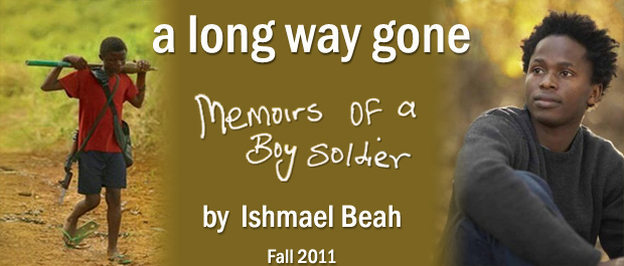Can a person come back from committing war crimes to lead a positive life that contributes to the good of society and the long-term survival of life? Of course they can. With Beah's story in mind, let's read through this weeks' thought experiment again.
------------------------------------------
Private Sacks was about to do a terrible thing. He had been ordered to first rape and then murder the prisoner, whom he knew to be no more than an innocent civilian from the wrong ethnic background. There was no doubt in his mind that this would be a gross injustice - a war crime, in fact.
Yet quickly thinking it over he felt he had no choice but to go ahead. If he obeyed the order, he could make the ordeal as bearable as possible for the victim, making sure she suffered no more than was necessary. If he did not obey the order, he himself would be shot and the prisoner would still be violated and killed, but probably more violently. It was better for everyone if he went ahead.
His reasoning seemed clear enough, but of course it gave him no peace of mind. How could it be that he was both going to do the best he could in the circumstances and also a terrible wrong?
Baggini, J., The Pig That Wants to Be Eaten, 2005, p. 19.
-------------------------------------------
If we take Private Sacks' certainty at face value that "it was better for everyone if he went ahead," then it's not difficult at all to see how he could be doing a "terrible wrong" as well as "the best he could." In my post on justice, I noted how we must separate actions from intentions and judge them both independently. I said:
Intention and causation are not necessary for an action to be judged good or evil. Those judgments are based on objective reality and whether or not the actions promote or hinder the long-term survival of life. Praise or blame for these actions is tied to intention or neglect of intention. The magnitude of reward or punishment doled out from society should be proportional to the intention or the neglect.
As described in the thought experiment, Private Sacks' rape and murder would clearly be an objectively evil act, but his intentions while doing them would be good, which, while not exactly praiseworthy, do mitigate the blame and punishment he should receive for them, depending on the rest of Sacks' life story. He probably made other more blameworthy decisions in the past that led up to this moral dilemma, and he had better make some better choices soon after this one if he is to deserve any exoneration for this particular act, but the war crime might just be his least bad option.
So, paradoxically, it seems harder to think of a reason that Private Sacks should refuse to commit these war crimes. As it stands, he certainly didn't think of one. But perhaps he wasn't truly thinking of "everyone" when he said "it was better for everyone if he went ahead." Remember that we are a species governed by the survival and evolution of both our genes AND our culture. If Private Sacks refused the orders from his commander, his genes and those of the prisoner would both die off (and potentially quite gruesomely). But maybe their story of sacrifice would live on in the culture and inspire the saving of many other lives in this or other conflicts. Would that long-term benefit outweigh the short-term costs to Sacks and the prisoner? It might. Many other such acts have had this effect on humanity. Or it might just go to a silent grave as countless others have as well. This fate also depends on the rest of the private's circumstances. Is he a famous person? Would his act be witnessed and retold? In other words, how strong are his ties to society? Since this option didn't occur to Private Sacks in the thought experiment, I'm deducing that his ties weren't so strong, but then that's just another illustrative point to take away from this exercise: that we need to work to strengthen our moral ties to others so that together we help each other do good.
In that vein, I'll finish by recommending a recovery from this morbid experiment with a quick read of David Brook's op-ed in last week's New York Times: The Moral Bucket List. The essay lists six characteristics that Brooks has gleaned from interactions with "deeply good" people who have made an impression on him. Following the advice of his column may not stop war crimes from being committed in the world, but it could just stop you or someone you know from doing more minor wrongs under the influence of companions. And with that in mind, thanks for being one of my moral companions and continuing to question these problems with me!


